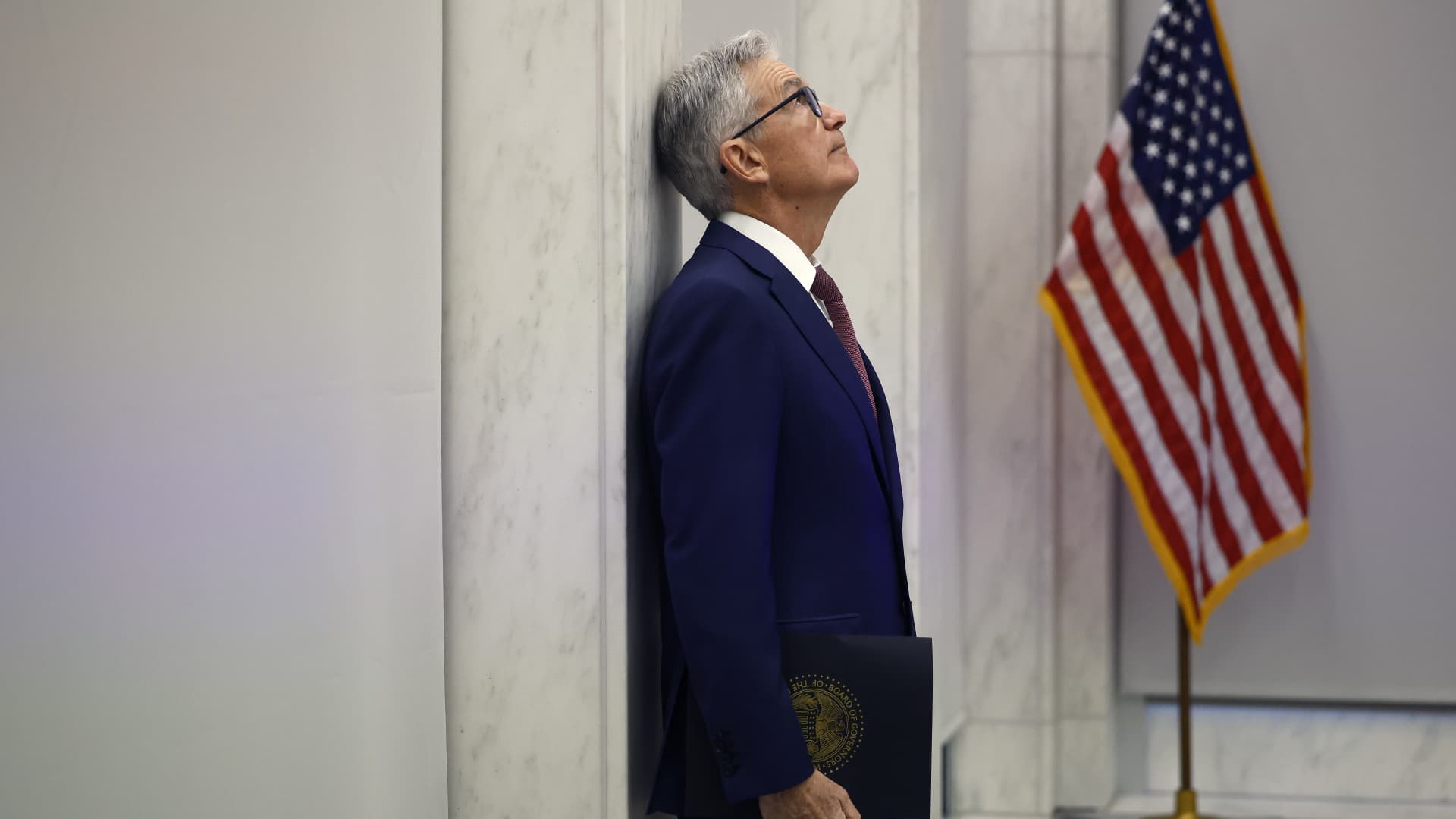

Here are the most important news items that investors need to start their trading day:
1. Snapped
The S&P 500 and Nasdaq Composite snapped their longest win streaks in two years on Thursday. The S&P 500 fell 0.8% during the session after eight straight days of gains, while the tech-heavy Nasdaq Composite declined 0.9% after nine days of gains. The Dow Jones Industrial Average also decline, dropping nearly 0.7%. On the week, the S&P 500 and the Dow are down 0.3% and 0.5%, respectively, heading into the final trading session, while the Nasdaq is up 0.3% week to date. Follow live market updates.
2. Not confident
Fed Chairman Jerome Powell prepares to deliver remarks to the The Federal Reserve’s Division of Research and Statistics Centennial Conference on November 08, 2023 in Washington, DC.
Chip Somodevilla | Getty Images
Federal Reserve Chairman Jerome Powell said Thursday the central bank is unsure whether it’s done enough to keep cooling inflation. The Fed has maintained a commitment to achieving 2% inflation and is “not confident that we have achieved such a stance,” Powell said during remarks to the International Monetary Fund. The comments come a little more than a week after the Fed left interest rates unchanged at a target range of 5.25% to 5.5%. Powell said he and his fellow policymakers are “gratified” by progress in consumer price gauges, “but expect that the process of getting inflation sustainably down to 2% has a long way to go.”
3. New thresholds
Zach Gibson | Getty Images News | Getty Images
Income tax brackets and standard deductions will be set a little higher for 2024, the IRS said Thursday. The changes take effect for tax year 2024, meaning for returns filed in 2025, and reflect a period of persistent inflation for the U.S. economy. In 2024, the highest rate of 37% will apply to individuals with taxable income above $609,350 and married couples earning $731,200. The standard deduction will increase to $14,600 for individuals, up from $13,850 for the 2023 tax year, and $29,200 for married couples, up from $27,700.
4. Ceding his seat
Sen. Joe Manchin, D-W.Va., speaks during the Senate Appropriations Committee markup of the “Military Construction, Veterans Affairs, and Related Agencies Appropriations Act, 2024,” and the “Agriculture, Rural Development, Food and Drug Administration, and Related Agencies Appropriations Act, 2024,” in Dirksen Building on Thursday, June 22, 2023.
Tom Williams | Cq-roll Call, Inc. | Getty Images
Sen. Joe Manchin won’t run for reelection in 2024, clearing a path for the GOP to claim a majority in next year’s Senate elections. Manchin, a conservative Democrat who’s become highly critical of President Joe Biden’s policies, will be vacating a seat in deep-red West Virginia. With Manchin out of the Senate — and possibly out on the presidential campaign trail, if speculation is to be believed — chamber Republicans can likely secure the seat and the edge. “We like our odds in West Virginia,” National Republican Senatorial Committee Chairman Steve Daines said in a statement to NBC following Manchin’s announcement.
5. Anti-aging Alphas
Inside an Ulta store in New York.
Scott Mlyn | CNBC
You’re never too young to start fighting aging, at least according to Gen Alpha’s holiday wish lists. The youngest generation of consumers, born in 2010 and later, has taken a particular interest in skincare, CNBC’s Gabrielle Fonrouge reports, and it’s likely to drive end-of-year spending. The uptake is partly thanks to TikTok and other social media sites where kids (with parental permission) can get exposure to toners, serums and moisturizers with the help of “skinfluencers.” And it’s not all as bad as it sounds: Experts say the routine-making involved in skincare is positive for young kids, especially if that morning routine includes sun protection.
– CNBC’s Hakyung Kim, Jeff Cox, Kate Dore, Kevin Breuninger and Gabrielle Fonrouge contributed to this report.
— Follow broader market action like a pro on CNBC Pro.
